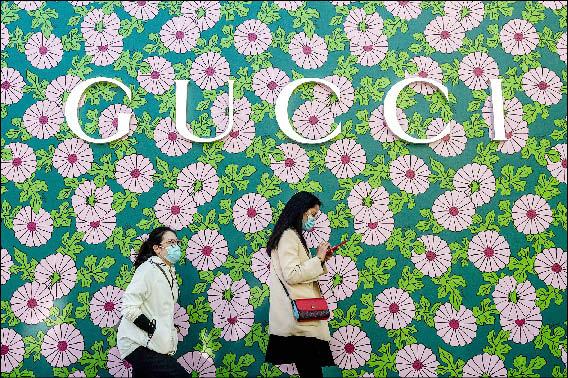Gucci’s sales rebounded in the first quarter, signaling a recovery for the luxury brand after the appeal of its flamboyant fashions waned last year.
Comparable sales, a key measure of retail performance, jumped 25 percent at the Italian fashion house to 2.17 billion euros (US$2.61 billion), owner Kering SA said in a statement on Tuesday. Analysts had expected a 19 percent gain. Gucci represents 56 percent of total group revenue.
Gucci, which is marking its 100th anniversary this year, suffered more last year than some of its fashion peers. Shoppers judged the luxury brand’s maximalist aesthetic to be out of step with the mood during the COVID-19 pandemic.

Photo: AFP
Kering also underinvested in marketing and product launches at Gucci last year, Kering chief financial officer Jean-Marc Duplaix said during a call with analysts.
However, the company has since changed tack with pop-up events in its stores, and the Italian name is soon to release a new handbag with a bamboo handle, he said.
Last quarter, Gucci benefited from “triple-digit” percentage growth rates in China, aided by positive consumer sentiment, he said.
More than half of the brand’s revenue came from the Asia-Pacific region.
Sales in the retail network in North America — its second-biggest market — grew 51 percent. Duplaix pointed to stimulus checks in the US as a factor in the results.
Kering’s Bottega Veneta and Yves Saint Laurent brands in the first quarter had comparable sales growth of 25 percent and 23 percent respectively, which also exceeded estimates.
Bottega Veneta has been relying in part on so-called influencers to promote its products on social media.
Bottega Veneta had its best first quarter ever, Duplaix said.
Overall, “we’re very satisfied with the start of this year,” he said.
On average in the first quarter, 17 percent of Kering’s stores were shut, with about 50 percent closed in Europe. That proportion increased this month with lockdowns in France and Italy, Duplaix added.
Kering has been reducing Gucci’s reliance on wholesalers and instead favoring distribution via its own stores to better control its image and pricing.

CAUTIOUS RECOVERY: While the manufacturing sector returned to growth amid the US-China trade truce, firms remain wary as uncertainty clouds the outlook, the CIER said The local manufacturing sector returned to expansion last month, as the official purchasing managers’ index (PMI) rose 2.1 points to 51.0, driven by a temporary easing in US-China trade tensions, the Chung-Hua Institution for Economic Research (CIER, 中華經濟研究院) said yesterday. The PMI gauges the health of the manufacturing industry, with readings above 50 indicating expansion and those below 50 signaling contraction. “Firms are not as pessimistic as they were in April, but they remain far from optimistic,” CIER president Lien Hsien-ming (連賢明) said at a news conference. The full impact of US tariff decisions is unlikely to become clear until later this month

With an approval rating of just two percent, Peruvian President Dina Boluarte might be the world’s most unpopular leader, according to pollsters. Protests greeted her rise to power 29 months ago, and have marked her entire term — joined by assorted scandals, investigations, controversies and a surge in gang violence. The 63-year-old is the target of a dozen probes, including for her alleged failure to declare gifts of luxury jewels and watches, a scandal inevitably dubbed “Rolexgate.” She is also under the microscope for a two-week undeclared absence for nose surgery — which she insists was medical, not cosmetic — and is

GROWING CONCERN: Some senior Trump administration officials opposed the UAE expansion over fears that another TSMC project could jeopardize its US investment Taiwan Semiconductor Manufacturing Co (TSMC, 台積電) is evaluating building an advanced production facility in the United Arab Emirates (UAE) and has discussed the possibility with officials in US President Donald Trump’s administration, people familiar with the matter said, in a potentially major bet on the Middle East that would only come to fruition with Washington’s approval. The company has had multiple meetings in the past few months with US Special Envoy to the Middle East Steve Witkoff and officials from MGX, an influential investment vehicle overseen by the UAE president’s brother, the people said. The conversations are a continuation of talks that

CHIP DUTIES: TSMC said it voiced its concerns to Washington about tariffs, telling the US commerce department that it wants ‘fair treatment’ to protect its competitiveness Taiwan Semiconductor Manufacturing Co (TSMC, 台積電) yesterday reiterated robust business prospects for this year as strong artificial intelligence (AI) chip demand from Nvidia Corp and other customers would absorb the impacts of US tariffs. “The impact of tariffs would be indirect, as the custom tax is the importers’ responsibility, not the exporters,” TSMC chairman and chief executive officer C.C. Wei (魏哲家) said at the chipmaker’s annual shareholders’ meeting in Hsinchu City. TSMC’s business could be affected if people become reluctant to buy electronics due to inflated prices, Wei said. In addition, the chipmaker has voiced its concern to the US Department of Commerce